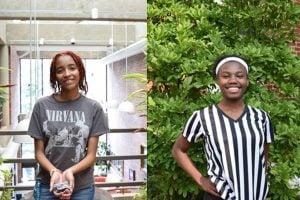
The Whiting Internships in Science and Engineering (WISE) program pairs highly motivated Baltimore City high school students with Johns Hopkins Engineering graduate student mentors for paid research internships in the summer, fall, or spring semesters. Created 10 years ago to encourage women in STEM fields, WISE has evolved into a co-ed program that fosters diverse young talent by giving students hands-on lab experience while building a supportive network. The program is run by WSE’s Center for Educational Outreach.
“WISE nurtures future scientists and enhances the diversity in the field,” said Alexis Daniels, the program manager.
This summer, six students participated in the program, supported by National Science Foundation CAREER grants, along with funding from a private donor and a gift from Johnson & Johnson.
In 2024, a Packard Foundation grant—part of its Diversity, Equity, and Inclusion Pilot Fund—will allow Daniels to add several features to the program, including peer-led lab tours and lunch-and-learn Fridays during which students interact with a variety of mentors from departments. Eight students will be supported by the Packard grant.
We caught up recently with two of this summer’s students to hear about their experiences.
Saria Malik, a senior at Western High School, spent the summer applying theoretical algorithms and computer science concepts to real life in the laboratory of Michael Dinitz, an associate professor in the Department of Computer Science at the Whiting School. This was Malik’s third summer as a WISE student, but her first working in computer science.
In addition to the exposure to science and scientists that participating in WISE offers, Malik keeps returning simply because she enjoys the program’s opportunity to take part in hands-on learning and to work closely with a mentor.
“They make it so you’re enjoying your time here. You pick your schedule, and your project; they base it around you and your interests. You’re actually having fun, and doing something you’d like to do,” said Malik, whose summer mentor was Ama Koranteng, a graduate student in computer science.
The program is so supportive that she did not feel immense pressure, even as the sole high school student working in the Dinitz lab.
“You’d expect the expectations to be really high, but everyone’s so understanding, that even if I didn’t know it, they’d take the time to teach me, so we could all be on the same level,” Malik said.
Most of all, she said she was grateful for the opportunity to study at a university like Hopkins.
“Being a black kid, a black female at that, getting the opportunity to do this, at such a prestigious school, you don’t see a lot of other schools doing that. This program really wants to help the community,” she said.
She also viewed WISE as an opportunity to prove herself and to learn from mentors.
“Being a black woman in a STEM field is hard. You don’t see a lot of people like yourself, so since it’s not diverse enough, a lot of black people might feel afraid to go into these fields because they feel underrepresented…Just know that everyone is different, in a way. So even if you stand out because of your complexion, or because you’re a woman, what’s going to make you stand out even more is your brain. When they see what you’re capable of, they’ll be more accepting of you,” she said.
Dania Solomon, a rising senior at Paul Laurence Dunbar High School, spent her summer in the laboratory of Daniel Viete, an assistant professor in the Krieger School of Arts and Science’s Department of Earth and Planetary Sciences, studying the aging of rocks using zircons, minerals that contain a small amount of uranium. Despite the field of geology being new to her, Solomon said she had no trouble diving right in.
“I like to learn about anatomy, and different structures about different things, like people, plants, or animals. It’s the curiosity in us to figure out what things are made of, different layers of the Earth or the human body,” she said.
Solomon found that the environment at Hopkins encourages what she calls “unselfconscious learning.”
“At high school, you have to learn the stuff to graduate, but when you come here you want to learn. The learning environment here is more hands-on. I’m the type of person who wants to learn hands-on, instead of someone telling me what to do and then not checking up,” she said.
Though she values independence in her academic life, she found that her WISE mentor, graduate student Supratik Roy, was an invaluable resource, as was the network of mentors available to her during the program.
“Me meeting new people that know so much, that’s going to be a great memory for me. I really admire them, because it shows that people will do hard work to get what they want. And they’ll stay in school to do what they want,” she said.
She advises other students to focus on their future and to be confident. She says she has overcome discrimination “by being determined and telling myself, ‘I can do this,’ regardless of what anybody else tells me.”
Students interested in WISE and faculty interested in hosting a WISE intern can find more information on the WISE website.